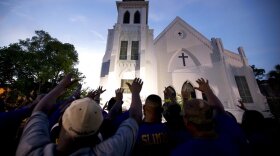-
The U.S. Supreme Court will not hear a case filed by Jennifer Pinckney, the wife of the late Rev. Clementa Pinckney killed in the massacre at Mother Emanual in 2015.
-
July 10, 2025, marks 10 years since South Carolina lowered the Confederate battle flag from the Statehouse grounds. The flag was taken to the Confederate Relic Room and Military History Museum in Columbia.
-
On this episode of the South Carolina Lede for June 21, 2025: we bring you part two of our 10-year commemoration of the Mother Emanuel AME Church shooting featuring stories from our Voices Collected initiative, focusing on the downing of the Confederate flag, legislative issues like hate crimes, and gun reforms that have stalled in the state; and more.
-
Althea Richardson Latham, who served as secretary for the late Reverend and Senator Clementa Pinckney, shares how she’s moved from anger to healing, during the 10 years since the tragic massacre at Mother Emanuel AME Church in Charleston.
-
As Charleston marks the 10-year anniversary of one of the nation's most horrific hate crimes, the community looks back and asks, "what's still needed to heal?"
-
On this episode of the South Carolina Lede for June 17, 2025: the first of two episodes dedicated to the 10-year commemoration of the Mother Emanuel AME Church shooting where nine black parishioners, including the pastor of the church state Sen. Clementa Pinckney, were murdered in a racially fueled massacre; we’ll share reflections from South Carolinians who participated in our Voices Collected initiative as well as from folks who participated in the Charleston Forum last week.
-
In his book Mother Emanuel: Two Centuries of Race, Resistance, and Forgiveness in One Charleston Church (2025, Crown) Pulitzer Prize–winning journalist Kevin Sack explores the inspiring history that brought the church to that moment, and the depth of the desecration committed in its fellowship hall.In this expanded episode of Walter Edgar's Journal, Sack joins us to explore the story of Emanuel A.M.E. Church in Charleston.
-
In his book Mother Emanuel: Two Centuries of Race, Resistance, and Forgiveness in One Charleston Church (2025, Crown) Pulitzer Prize–winning journalist Kevin Sack explores the inspiring history that brought the church to that moment, and the depth of the desecration committed in its fellowship hall.In this expanded episode of Walter Edgar's Journal, Sack joins us to explore the story of Emanuel A.M.E. Church in Charleston.
-
On this episode of the South Carolina Lede for May 27, 2025: lawmakers return to Columbia to take up the $14.7 billion state budget for the coming fiscal year; state Democrats have a big week with their convention and major events featuring two prominent voices in the party; we bring you one of the Voices Collected for our Mother Emanuel remembrance initiative; and more!
-
Parkland. Uvalde. Columbine. Sandy Hook. A supermarket in Buffalo. A church in South Carolina. A synagogue in Pittsburgh. When violence comes to a public place, as it does all too often in our era, a delicate question lingers afterward: What should be done with the buildings where blood was shed?

Play Live Radio
Next Up:
0:00
0:00
Available On Air Stations









